EDIT: Users @apocalisp and @BenjaminHodgson left awesome answers below, skip reading most of the question and jump to their answers.
TLDR of the Question: How can I go from the first picture, where FSM states combinatorial explode, to the second picture, where you're just required to visit all of them before moving on.
I would like to build a Finite State Machine (in Haskell really, but I'm trying Idris first to see if it can guide my Haskell) where there are some interim states that must be visited before a final state can be reached. It'd be great if I could arbitrarily constrain the FSM with predicates on some state.
In the following picture, there's an Initial state, 3 interim states A, B, C, and a Final state. If I'm not mistaken, in a "normal" FSM, you will always need n! interim states to represent each combination of possible paths.
This is undesirable.
Instead, using Type Families, and maybe Dependent types, I think it should be possible to have a sort of state that is carried around, and only when it passes certain predicates will you be allowed to travel to the final state. (Does that make it Push Down Automata instead of FSM?)
My code so far (idris), which by analogy, is adding ingredients to make a salad, and the order doesn't matter, but they all need to make it in:
data SaladState = Initial | AddingIngredients | ReadyToEat
record SaladBowl where
constructor MkSaladBowl
lettuce, tomato, cucumber : Bool
data HasIngredient : (ingredient : SaladBowl -> Bool) -> (bowl : SaladBowl ** ingredient bowl = True) -> Type where
Bowl : HasIngredient ingredient bowl
data HasIngredients : (ingredients : List (SaladBowl -> Bool))
-> (bowl : SaladBowl ** (foldl (&&) True (map (\i => i bowl) ingredients) = True))
-> Type where
Bowlx : HasIngredients ingredients bowl
data SaladAction : (ty : Type) -> SaladState -> (ty -> SaladState) -> Type where
GetBowl : SaladAction SaladBowl Initial (const Initial)
AddLettuce : SaladBowl -> SaladAction (bowl ** HasIngredient lettuce bowl) st (const AddingIngredients)
AddTomato : SaladBowl -> SaladAction (bowl ** HasIngredient tomato bowl) st (const AddingIngredients)
AddCucumber : SaladBowl -> SaladAction (bowl ** HasIngredient cucumber bowl) st (const AddingIngredients)
MixItUp : SaladBowl -> SaladAction (bowl ** (HasIngredients [lettuce, tomato, cucumber] bowl)) AddingIngredients (const ReadyToEat)
Pure : (res : ty) -> SaladAction ty (state_fn res) state_fn
(>>=) : SaladAction a state1 state2_fn
-> ((res : a) -> SaladAction b (state2_fn res) state3_fn)
-> SaladAction b state1 state3_fn
emptyBowl : SaladBowl
emptyBowl = MkSaladBowl False False False
prepSalad1 : SaladAction SaladBowl Initial (const ReadyToEat)
prepSalad1 = do
(b1 ** _) <- AddTomato emptyBowl
(b2 ** _) <- AddLettuce b1
(b3 ** _) <- AddCucumber b2
MixItUp b3
And counter example programs that the compiler should error on:
BAD : SaladAction SaladBowl Initial (const ReadyToEat)
BAD = do
(b1 ** _) <- AddTomato emptyBowl
(b2 ** _) <- AddTomato emptyBowl
(b3 ** _) <- AddLettuce b2
(b4 ** _) <- AddCucumber b3
MixItUp b4
BAD' : SaladAction SaladBowl Initial (const ReadyToEat)
BAD' = do
(b1 ** _) <- AddTomato emptyBowl
MixItUp b1
I eventually want the "ingredients" to be Sums instead of Bools (data Lettuce = Romaine | Iceberg | Butterhead), and more robust semantics where I can say things like "you must first add lettuce, or spinach, but not both".
Really, I feel so quite thoroughly lost, that I imagine my above code has gone in the completely wrong direction... How can I build this FSM (PDA?) to preclude bad programs? I'd especially like to use Haskell for it, perhaps using Indexed Monads?

